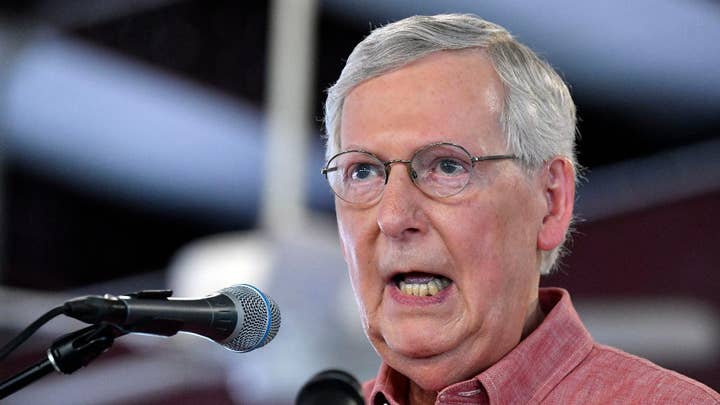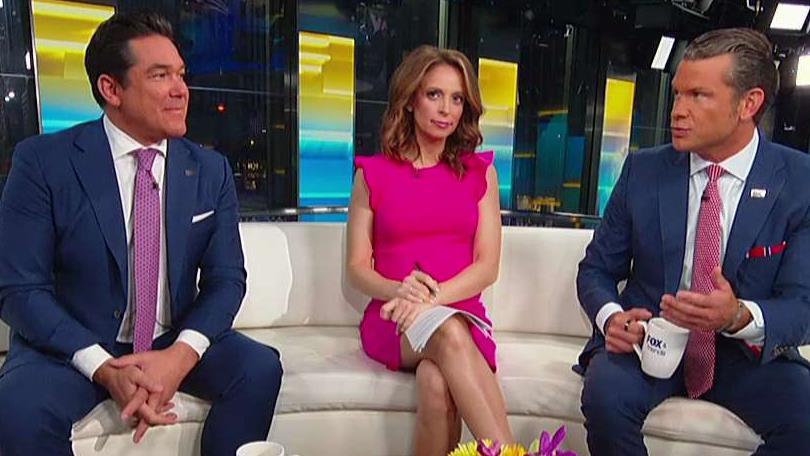Fox News Flash top headlines for August 13
Fox News Flash top headlines for August 13 are here. Check out what's clicking on Foxnews.com
I learned a long time ago to pay close attention to the precise verbiage of Senate Majority Leader Mitch McConnell.
McConnell usually says what he means. It’s others who divine meaning and interpretation onto the language of the Kentucky Republican. But, without fail, McConnell says exactly what he means.
Consider what McConnell said during a recent appearance on WHAS Radio in Louisville about guns.
“We’re going to begin these discussions over the August break and when we get back [Sept. 9], hopefully, we’ll be in a position to agree on things on a bipartisan basis and go forward and make law.”
So, let’s parse what McConnell didn't say.
The majority leader didn’t say the Senate would have a formal “debate” on the Senate floor about firearms, as at least a couple of news outlets reported. McConnell didn’t say the Senate would even consider a bill.
“I want to make a law,” McConnell said.
Such a proposition would entail the Senate debating actual legislation. But McConnell didn’t commit to that. The majority leader was vague about what bill or bills could be candidates to become law. He also indicated prospective legislation would have to score 60 yeas to overcome not one but two rounds of filibusters. And McConnell gave himself a potential exit ramp from the whole enterprise.
“It has to pass the House,” McConnell told WHAS, adding it “has to be signed by President Trump.”
There's no special code in McConnell's locution. Any bill requires passage by the House and Senate, plus the signature of the president, to become law. But, McConnell is simultaneously, and overtly suggesting, something else. There may be no way the House, Senate, and president can come together on anything. It’s hard enough to get all three on the same page with garden-variety legislation.
TWITTER UNLOCKS MCCONNELL'S CAMPAIGN ACCOUNT AFTER GOP FURY
So, you understand the difficulty of the task in the twilight of this month's shootings in El Paso, Texas, and Dayton, Ohio. Policymakers never have been able to come together and make federal law on firearms after any other mass shooting. So why, oh why, would the aftermath of El Paso and Dayton be any different?
That’s not to say that McConnell isn’t open to trying to tackle a bill. McConnell told WHAS that “what’s happened after every one of these shootings is there’s been a temptation to just engage in political discourse rather than passing something.”
Some analysts may view such a remark as a fig leaf for McConnell to avoid actually doing something on guns. Possibly. But McConnell certainly can then accuse people of trying to politicize the shootings if lawmakers stumble.
Things which pass the House don’t always fare well in the Senate. One could easily imagine a scenario in which the Senate is stymied at advancing anything due to the 60-vote requirement to overcome filibusters. In fact, as McConnell pointed out, the Senate likely would have to marshal 60 yeas not once but twice on gun-related legislation.
This is why it’s not a stretch to see no Senate action at all when lawmakers return in September – or a scenario similar to the one which played out in the spring of 2013.
HARMEET DHILLON: MCCONNELL CAMPAIGN TWITTER BAN IS LATEST SHOT IN BEG TECH'S WAR ON CONSERVATIVES
The Senate didn’t get around to addressing firearms after the December 2012 attack at Sandy Hook Elementary School in Newtown, Conn., until April 2013, and when the Senate did vote, senators cast their ballots with the understanding that nothing would pass.
In 2013, McConnell forged an agreement with then-Senate Majority Leader Harry Reid, D-Nev., to take a series of gun-related votes. It was a devil’s bargain. The Reid-McConnell pact required not a simple majority to adopt any amendments related to guns – but 60 votes.
There was a conservative amendment, drafted by Sens. Chuck Grassley, R-Iowa, Ted Cruz, R-Texas, Lindsey Graham, R-S.C., and then-Sen. Dan Coats, R-Ind. That proposal scored 52 "yea" votes, but that’s a far cry from 60.
Reid obviously didn’t want the Senate to pass the conservative plan – especially in a Senate controlled by the Democrats. President Obama (remember, this was 2013), certainly wouldn’t sign such a plan. But, Reid knew that bill could score a simple majority and it did. So, by requiring 60 "yea" votes, Reid made sure the Senate euthanized the GOP plan.
Sens. Joe Manchin, D-W.Va., and Pat Toomey, R-Pa., developed a bipartisan compromise on background checks. The Senate had sufficient votes to adopt the Manchin-Toomey legislation. Still, many Republican senators opposed that proposal. McConnell may have been the minority leader at the time, but he certainly wasn’t going to allow Manchin-Toomey to pass.
That’s why Reid and McConnell forged their devil’s bargain. Both sides played defense. Various gun proposals could record 51 "yea" votes in the Senate, but none could secure 60 yeas to overcome a filibuster. So, Reid and McConnell decided to set up a vote sequence to kill all proposals. That would entail subjecting each amendment to a 60-vote requirement for adoption.
SENATE DEMS DELIVER STUNNING WARNING TO SUPREME COURT: 'HEAL' OR FACE RESTRUCTURING
Among the amendments which withered on the 60-vote vine: a plan by Sen. Dianne Feinstein, D-Calif., to resuscitate the assault-weapons ban which expired in 2004. Naturally, defenders of the Second Amendment abhorred that proposal. Feinstein’s amendment failed 60-40 – not even coming close to 51 "yea" votes.
So, the sides pre-baked the gun vote series in such a way that it was a fait accompli the Senate wouldn’t approve anything on firearms. Some of the ideas scored more than a majority in the Senate, but the 60-vote threshold doomed all plans to failure.
There’s a reason why Reid - as he wrote this week in The New York Times - has wanted to eliminate the filibuster. Such a maneuver would discard the ever-present requirement of coughing up 60 votes to halt filibusters. And, in the present gun debate, McConnell and many others know it’s a challenge to vault the 60-vote hurdle.
It may be impossible for the Senate to pass something on guns, let alone finesse legislation into law. One never knows if lawmakers could come up with something which commands 60 votes in the Senate and is also endorsed by the House and President Trump. There’s a chance McConnell may not like such legislation. But, if McConnell sticks to the parameters he laid out, he might not have much of a reason to explain why he won’t allow a measure to advance through the Senate.
CLICK HERE TO GET THE FOX NEWS APP
Still, we’re a long way from that scenario.
So, for now, senators will have “discussions,” as McConnell suggested, and unless there’s a major breakthrough, discussions could be the only postscript to the massacres in El Paso and Dayton.















































